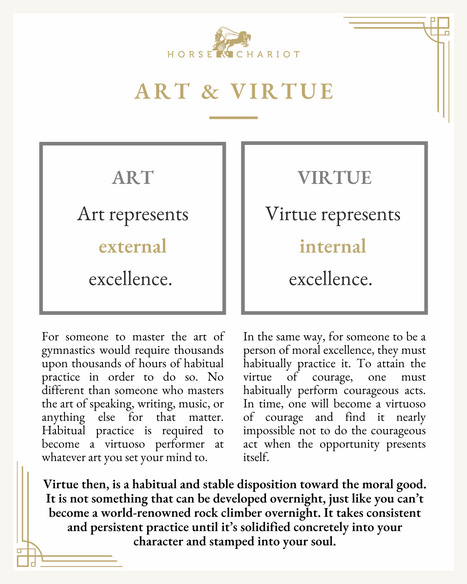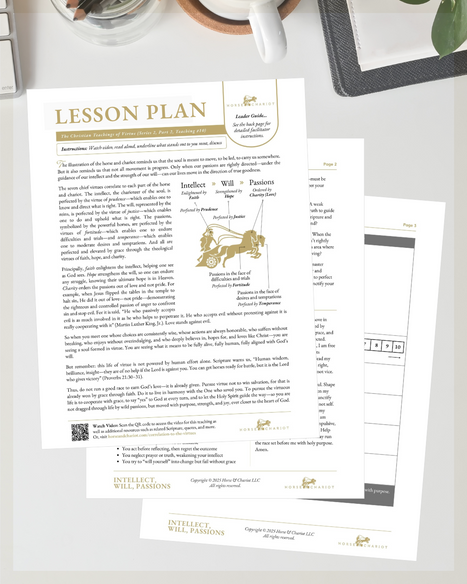All Series > Virtue & Vice > Part 1
Art & Virtue
(Series 3, Part 1, Teaching #17)
Watch: On YouTube
Art & Virtue
When it comes to excellence—
Art represents external excellence, and virtue represents internal excellence.
It is said, “We are what we repeatedly do. Excellence, therefore, is not an act but a habit” (Aristotle). Consider a gymnast. The grace and power seen in their movements are not the result of chance, but of thousands of hours spent falling, failing, correcting, and trying again. The same is true for any great artist, athlete, speaker, musician, salesperson, surgeon, or craftsman. Behind every display of excellence is a life of habitual practice. They didn’t become masters in a single act—they became virtuoso performers through countless acts of effort, repetition, and discipline.
The same is true for the soul. The pursuit of moral excellence—virtue—requires just as much practice as any art. The difference is that, while art shapes the body and mind, virtue shapes the heart and soul. To become courageous, you must habitually perform courageous acts. To become patient, you must practice patience again and again, even when it pains you. To become honest, you must choose honesty, especially when it exposes you. Eventually, it becomes second nature—like muscle memory for your character—to the point where not doing what is courageous, patient, or honest when the opportunity presents itself is next to impossible.
This is the path of interior excellence. Virtue, then, is a habitual and stable disposition toward the moral good. It is not something that can be developed overnight—just as you can’t become a world-renowned rock climber overnight. It takes consistent and persistent practice—choosing the good, rejecting the bad, again and again—until it is solidified into your character and stamped upon your soul. It becomes, over time, who you are.
Like a master painter who can create beauty with a single stroke, the virtuous one moves through life with moral precision—not because they are striving to be good in each moment, but because they have become good by nature. Their character is formed in virtue; their soul, moved by grace and strengthened through cooperation with it, reflects the likeness of Christ.
Truly, “The test of the artist does not lie in the will with which he goes to work, but in the excellence of the work he produces” (St. Thomas Aquinas). Thus, the virtuous life is not a performance for others to see—it is the formation of excellence from within. And just as a musician’s hands become an extension of their instrument, so too does your soul—your intellect, will, and passions—become an extension of Christ when perfected by grace, ordered by love, and guided by virtue.
The journey is long. But don’t be discouraged by how far you have to go. Just take the next step. Make the next right choice. Form the habit. Build the spiritual muscle. Forge the character. For if you stay the course, day by day, virtue will not only become your habit—it will become your identity in Christ.
This is the art of a holy life. The excellence of the soul. The path to becoming who God wills you to be.

Scroll down for the lesson plan and other related resources associated with this teaching.
Copyright © 2022 Horse & Chariot. All rights reserved.
New teachings like this are released often. Subscribe free and never miss a teaching!
Resources

Visual Resource
Illustration highlighting how art represents internal excellence and virtue represents external excellence.

Free Lesson Plan
Perfect for small groups, families, classrooms, or personal reflection.

5-Minute Deep Dive
Deepen your understanding of this source teaching by listening to a brief podcast-style discussion (powered by Google Gemini).
Related Scripture
“...make every effort to supplement your faith with virtue, virtue with knowledge, knowledge with self-control, self-control with endurance, endurance with devotion, devotion with mutual affection, mutual affection with love. If these are yours and increase in abundance, they will keep you from being idle or unfruitful in the knowledge of our Lord Jesus Christ.” — 2 Peter 1:5-8 (NABRE)
“...whatever is true, whatever is honorable, whatever is just, whatever is pure, whatever is lovely, whatever is gracious, if there is any excellence and if there is anything worthy of praise, think about these things.” — Philippians 4:8 (NABRE)
“Show me someone who does a good job [with excellence], and I will show you someone who is better than most and worthy of the company of kings.” — Proverbs 22:29 (GNT)
“For we are his handiwork, created in Christ Jesus for the good works that God has prepared in advance, that we should live in them.” — Ephesians 2:10 (NABRE)
“Each one, as a good manager of God's different gifts, must use for the good of others the special gift he has received from God.” — 1 Peter 4:10 (GNT)
“He has endowed them with skill to execute all types of work: engraving, embroidering, the making of variegated cloth of violet, purple, and scarlet yarn and fine linen thread, weaving, and all other arts and crafts.” — Exodus 35:35 (NABRE)
“It is the same with the artist and the craftsman, who work night and day engraving precious stones, carefully working out new designs. They take great pains to produce a lifelike image, and will work far into the night to finish the work. It is the same with the blacksmith at his anvil, planning what he will make from a piece of iron. The heat from the fire sears his skin as he sweats away at the forge. The clanging of the hammer deafens him as he carefully watches the object he is working take shape. He takes great pains to complete his task, and will work far into the night to bring it to perfection. It is the same with the potter, sitting at his wheel and turning it with his feet, always concentrating on his work, concerned with how many objects he can produce. He works the clay with his feet until he can shape it with his hands; then he takes great pains to glaze it properly, and will work far into the night to clean out the kiln. All of these people are skilled with their hands, each of them an expert at his own craft. Without such people there could be no cities; no one would live or visit where these services were not available. These people are not sought out to serve on the public councils, and they never attain positions of great importance. They do not serve as judges, and they do not understand legal matters. They have no education and are not known for their wisdom. You never hear them quoting proverbs. But the work they do holds this world together. When they do their work, it is the same as offering prayer.” — Sirach 38:27-34 (GNT)
“Birds come to roost with those of their own kind, and the habit of honesty comes to those who try to be honest.” — Sirach 27:9 (GNT)
Related Quotes
“We are what we repeatedly do. Excellence, therefore, is not an act but a habit.” — Aristotle
“The test of the artist does not lie in the will with which he goes to work, but in the excellence of the work he produces.” — St. Thomas Aquinas
“Seek not the good in external things; seek it in yourselves.” — Epictetus
“The art of living is more like wrestling than dancing.” — Marcus Aurelius
“Virtue is a kind of health, beauty and good habit of the soul.” — Plato
“I call myself a peaceful warrior because the battles we fight are on the inside.” — Socrates
“Excellence is an art won by training and habituation. We do not act rightly because we have virtue or excellence, but we rather have those because we have acted rightly. We are what we repeatedly do. Excellence, then, is not an act but a habit.” — Will Durant & Aristotle
“He who goes about to reform the world must begin with himself, or he loses his labor.” — St. Ignatius of Loyola
“Goodness is the only investment that never fails.” — Henry David Thoreau
“It is with art as with love: How can a man of the world, with all his distractions, keep the inwardness which an artist must possess if he hopes to attain perfection? That inwardness which the spectator must share if he is to understand the work as the artist wishes and hopes... Believe me, talents are like virtues…And they are only recognized and rewarded when we have practiced them in secret, like a dangerous mystery." — Johann Wolfgang von Goethe
“Excellence is not a gift, but a skill that takes practice. We do not act ‘rightly’ because we are ‘excellent’, in fact we achieve ‘excellence’ by acting ‘rightly’.” — Plato
"All things excellent are as difficult as they are rare." — Baruch Spinoza

Never miss a teaching — get all new teachings of virtue sent to your inbox free!
